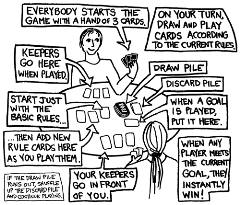 So, I’m back from Internet Librarian 2011 and as usual my head is full of big hairy audacious ideas but at this point there’s only one thing that’s blog-worthy; the story of what happened to me around gaming night.
So, I’m back from Internet Librarian 2011 and as usual my head is full of big hairy audacious ideas but at this point there’s only one thing that’s blog-worthy; the story of what happened to me around gaming night.
When it comes to gaming I play the occasional video game but I’m more of a player of card and board games. One of my current favorites is a card game called Fluxx from Looney Labs. It’s hard to describe since the rules and goal of the game constantly change, hence the name. During gaming night a fellow librarian came up to the table to watch the game and asked “how is this game relevant to libraries?” In my infinite wisdom I answered “uh, just to have fun.” Later she asked “why did you bring this game” and my equally stellar answer to this question was “because I enjoy teaching it to others.” Both answers were completely accurate but obviously I’d not thought either of these issues through at all.
The next morning the opening keynote at the conference was given by John Seely Brown, former head of Xerox PARC, author of the classic The Social Life of Information and the forthcoming A New Culture of Learning: Cultivating the Imagination for a World of Constant Change. One of his central points was that context is just as, if not more, important than the specifics when it comes to learning. This is something I’ve believed for years, and try to pass along myself whenever I get a chance. For example, I may not necessarily know how to solve a specific computer problem but I understand the context of the computer and it’s software enough (maybe something like, right-clicking in windows generally gets you a menu of options,) that I can apply the context to the specific situation and solve the problem at hand.
The next morning Donna Hopkins, the librarian at Champion Technologies and player of Fluxx the previous evening, came up to me and said “listening to the keynote this morning reminded me of your game last night.” At first I didn’t understand the connection at all and I asked her to explain it to me. Her basic point was that the basic rules of Fluxx, draw a card then play a card, was the general context of the game. However, as the rules and goals change, you need to take that general context and apply it to the particular situation that you’re faced during your turn.
Wow!
Let’s just say that I have a completely different point of view when it comes to this game now. Yes, it’s fun. (I’ve not yet taught it to someone who’s later said they never again wanted to play it.) But now I think I can use it as a way to demonstrate the context vs. specifics concept.
So, who’s up for a game of Fluxx?
(Image source: Wunderland.com – How to Play Fluxx 3.0)